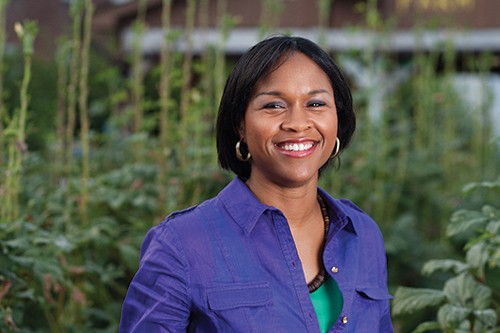
"At my core," says Tambra Raye Stevenson, MS, CPT. "I am a teacher and fighter for good food for all … I believe that food justice is the civil rights issue of our time. People should have access not just to food, but to the traditional foods that their DNA remembers and needs to be strong." In 2012, Washington D.C.-based Stevenson started NativSol Kitchen, "a right-brain approach to nutrition that taps into the spiritual, intuitive and creative elements [of food] to make a real impact."
Tell us about your work and how it fulfills a need in your community.
I found that a left-brain approach with facts, figures and logic didn’t translate into sustained behavior change. Food is more than function — it has spiritual, healing energy and brings us together to commune with our God. Through NativSol Kitchen, I provide educational outreach and cooking classes such as “Food for the Soul,” a spiritual nutrition program to help people put their faith where their fork is, and a “Taste of African Heritage,” blending spirituality, culture and food. In the classes, participants have homework activities, such as completing a pantry makeover, trying new food products, creating a letter to their ancestors and having a potluck dinner to share their skills. In the "Food for the Soul" series, participants write gratitude letters to God and share what they wish to change on their journey to wellness.
What inspired you to undertake this work or project?
When my father died unexpectedly in 2007, I reflected more deeply on my life and my purpose. I reconnected with my spirituality; I started practicing yoga, which led me to reconnect to my body and what I was putting into it. From there, I had a need to reconnect with my culture and find my roots in Africa, which led me to the Fulani tribe in Nigeria (I will be traveling there this year for the first time for my birthday). And that connection had me looking at my plate and how it reflects who I am.
How has your work made a difference in your community?
Over the past year, I have touched the lives of more than a thousand people. At one church, 55 participants collectively lost 300 pounds, decreased cholesterol and blood pressure levels and improved their overall senses of self. When I go to church or the store, I have people approach me and say how much the program has changed their lives and given them the confidence to help their families. These moments are what I live for — to know that I am making a difference in someone’s life.
Looking ahead, how would you like to see your project develop or grow?
NativSol has the potential to make a global impact starting with Africa, which is undergoing continued economic growth. With the boom of fast food chains on the continent, the need for nutrition education to stem the rates of diabetes, cancer, renal and heart diseases will be critical. That’s why I am making trips to West Africa to find out what changes are happening with food, culture and community. I also intend to have NativSol Kitchen on the forefront of pushing for access to heritage foods in America. For instance, the University of the District of Columbia owns 100-plus acres of land and is growing West African vegetables. I have promoted these food items in a community that didn’t realize their heritage crops were growing locally.
What do you find most rewarding about your efforts?
We have lost our way of understanding the power of preparing homemade meals with a touch of love that can uplift a person and prepare them for the next phase of their life’s journey. My chief reward is to create memorable meal moments among participants in the cooking classes. That’s the last image I have of my late father and I — cooking in the kitchen. When loved ones are gone, keeping those memories of how we spend quality time alive is important.
